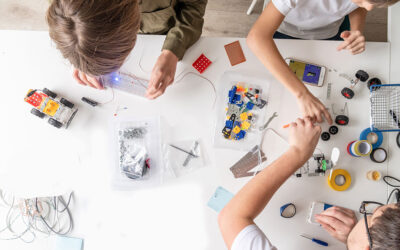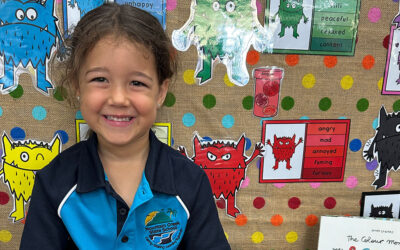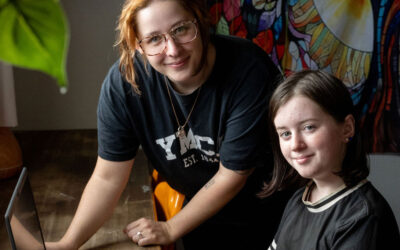As children grow and develop, families make adjustments. One major adjustment is in response to children starting school. Even when children have attended prior-to-school settings, starting school remains a time when families and children experience a great deal of change.
Sue Zweck, Head of Teaching and Learning K – 5 at Pacific Lutheran College provides some valuable information for parents preparing for this incredibly important milestone and highlights the significant role educators at Pacific play in supporting a positive transition to school.
“Being school-ready is not dependent on whether your child can read and write. Being school-ready is about the whole child. When deciding on the right time for your child to start school, it’s important to consider a range of factors, including your child’s age, emotional maturity, language skills, social skills, physical wellbeing and ability to undertake simple self-help tasks independently,” says Mrs Zweck.
Tips to ease the transition:
- Talk positively and confidently about starting and attending school.
- Speak with your child about the change in their daily routine, how will they get to school, what time they must get up in the morning and what they will have in their lunch box.
- Visit the school with your child before they start so they’re familiar with the classrooms, playground equipment, bubblers, toilets, sick bay and other key areas.
- Meet the teachers that may be working with your child and speak about them positively to your child and attend Parent Information Sessions.
- Tell your child about support systems that the school offers. e.g. Pacific Lutheran College have a buddy system where Year 5 students support and make connections with children in their first year of school.
- Read books together about starting school.
- Be involved in your child’s school community e.g., participating in playgroups, orientation days or other social gatherings like school fetes and welcome barbecues.
- Attend school events such as the book week parade, an assembly or school concert.
- Develop good relationships with other parents, especially other parents of your child’s friends.
- Establish good attendance patterns for your child, develop family routines at home to support your child’s learning at school e.g., read with your child each night.
“Our educators also play a significant role in supporting a successful transition to school. It’s important that your child’s individual needs are considered carefully to ensure that the transition process is positive and effective,” Mrs Zweck says.
Things you can do with your child to support their starting school
There is a range of transition-to-school experiences that the Pacific Lutheran Early Learning Centre implements to support children transitioning to Prep within the Foundation College. Some examples include:
- Talking to children about school and encouraging them to ask questions or voice their concerns.
- Arrange visits to Prep to meet the teachers and tour the setting.
- Prep students visit the service to talk about what school is like and show new children the College uniform, school bag and some of their work.
- Reading stories about starting school.
- Support children in developing their self-help and social skills through everyday routine activities such as mealtimes when children will practice using lunch boxes and drink bottles.
- Providing literacy items such as reading and writing materials in everyday play activities.
- Attend library and Chapel services on the College grounds, and towards the end of the year, have lunch with the current Preps and enjoy some play together.
- The Mission and Ministry team spend time in the Service singing and reading stories from the Bible weekly.
“I visit children coming to Pacific Lutheran College from other settings across September to November, Term 4 of the College calendar. During these visits, I tell a story, take the College uniform, and leave a special gift of a book so that the children can begin building a connection to the school,” says Mrs Zweck.
“Consider how you will manage your family’s routine and work arrangements during the school term. For example, if you will need out-of-school hours care. We encourage families to book in early for Before and After School and Vacation Care, to secure the days required,” Mrs Zweck says.
Starting Prep can be difficult for both parent and child, but it is also exciting and fun. The most important thing is to be as prepared as possible by following simple strategies and acknowledging your child’s and your own feelings.
“Don’t forget you are your child’s secure base, and you can calm them best. Most importantly, talk to your child and let them know you’ll support them, and when needed, you’ll figure out a solution to any problem together. It’s such an exciting time of growth for you and your child.”
Things you may consider as a family to help starting school
- Say goodbye confidently. Saying a quick, confident goodbye may help your child to feel secure and reassured that you trust that they will be okay.
- Label your child’s belongings. Labelling everything, including clothing, can help reduce anxiety for children, school staff and yourself. At school, children are responsible for their belongings and labels can help them with this.
- Communicate with your child. Take time to tell your child what might be happening at school that day, and in the afternoon, ask your child about their day. This is a great way to build confidence, and to find out how they are feeling as they settle in. If you have any concerns talk with your child’s teacher, who will provide further insight to their day.
- Avoid overloading your child. When children begin school, they tire easily. It may be worth considering fewer extracurricular activities such as swimming, music or dance lessons, until they adjust to their new routine.
You may also like…
Pacific Lutheran College offers pathways to success
Nurturing emotional growth at Pacific Lutheran College


